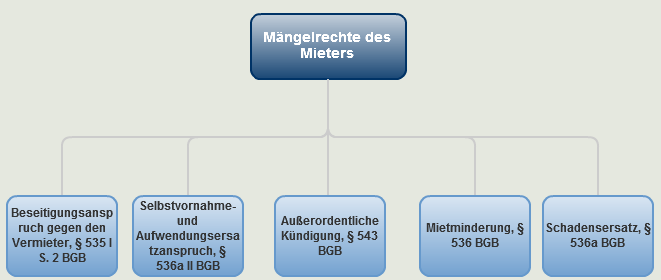Braunschweig Higher Regional Court, 18 October 2011, Ref.: 1 U 68/10
Pursuant to Section 536 (1) sentence 1, the tenant is exempt from paying rent during the period in which the rented property has a defect at the time of transfer to the tenant that cancels its suitability for use in accordance with the contract. Pursuant to Section 536 (1) sentence 2 BGB, the tenant only has to pay an appropriately reduced rent for the period during which the suitability is impaired.
In principle, the tenant can also reduce the rent due to external influences in accordance with Section 536 BGB. These external influences include, for example, noise, air pollution or odours.
These effects constitute a defect if they are not contractually required, regardless of whether they must be tolerated by the landlord as owner.
Depending on the type and severity of the defect, the tenant can also claim a rent reduction of a certain percentage in these cases, up to complete exemption from the rent.
In such cases, it is generally problematic to assess whether the tenant could or should have known at the time the contract was concluded that these external influences would occur or increase during the tenancy period.
FactsIn the above-mentioned case, a snack bar operator (defendant) had reduced the rent to a not inconsiderable extent because renovation work was being carried out on a church located near his snack bar.
As part of this renovation work, the church and the tower were scaffolded and surrounded by a transparent construction fence.
The defendant justified the reduction on the grounds that the disruption caused by the renovation work had resulted in a drop in sales of more than %.
The plaintiff landlady immediately sued for payment of the withheld rent and was upheld by the regional court.
Braunschweig Higher Regional CourtThe OLG Braunschweig dismissed the defendant's appeal against this decision on the grounds that a rent reduction generally requires a defect in the rented property itself. However, this was not the case here, as no defect in the business premises itself had been claimed.
Actual or legal circumstances outside the rented property (e.g. construction work in the neighbourhood) could only entitle the tenant to reduce the rent if they would directly impair the suitability of the rented property.
Disruptions to the use of the rental property due to construction work in the neighbourhood are only relevant under warranty law if the tenant did not have to expect such disruptions when concluding the rental agreement and they must therefore be deemed contractually excluded.
Particularly if there is recognisably older building fabric on the neighbouring property, the tenant must generally expect disturbances due to construction and/or renovation work on the neighbouring property.
Source: Braunschweig Higher Regional Court
You can find a free rent reduction calculator here.
Important Note: The content of this article has been prepared to the best of our knowledge and belief. However, due to the complexity and constant evolution of the subject matter, we must exclude liability and warranty. Important Notice: The content of this article has been created to the best of our knowledge and understanding. However, due to the complexity and constant changes in the subject matter, we must exclude any liability and warranty.
If you need legal advice, feel free to call us at 0221 – 80187670 or email us at info@mth-partner.de.


